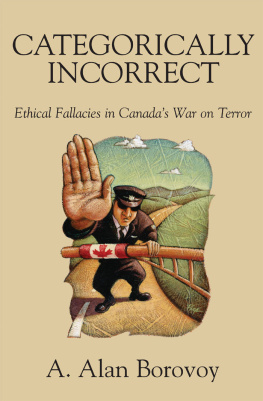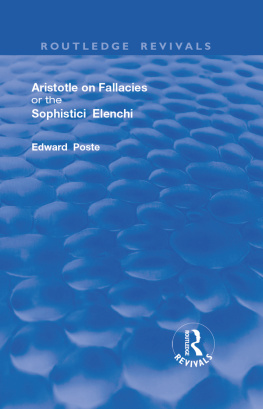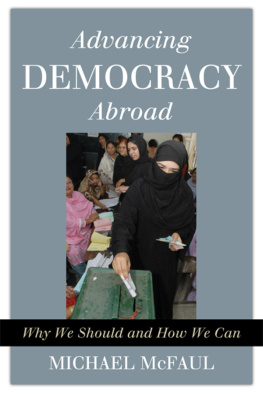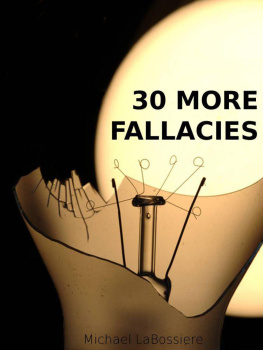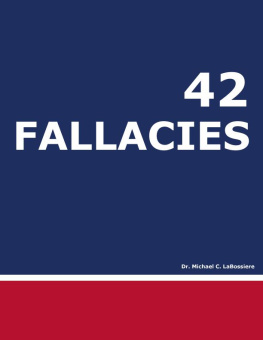Copyright A. Alan Borovoy, 2006
All rights reserved. No part of this publication may be reproduced, stored in a retrieval system, or transmitted in any form or by any means, electronic, mechanical, photocopying, recording, or otherwise (except for brief passages for purposes of review) without the prior permission of Dundurn Press. Permission to photocopy should be requested from Access Copyright.
Editor: Michael Carroll
Design: Alison Carr
Printer: University of Toronto Press
Library and Archives Canada Cataloguing in Publication
Borovoy, A. Alan
Categorically incorrect : ethical fallacies in Canadas war on terrorism / A. Alan Borovoy.
Includes bibliographical references and index.
ISBN 10: 1-55002-628-3
ISBN 13: 978-1-55002-628-3
1. Afghan War, 2001- --Canada. 2. Afghan War, 2001- --Moral and ethical aspects. 3. Democracy--Canada. 4. War on Terrorism, 2001- --Moral and ethical aspects. 5. Civil rights--Canada. 6. Canada--Foreign relations--1945-. I. Title.
HV6433.C3B67 2006 303.6250971 C2006-905968-3
1 2 3 4 5 10 09 08 07 06
We acknowledge the support of the Canada Council for the Arts and the Ontario Arts Council for our publishing program. We also acknowledge the financial support of the Government of Canada through the Book Publishing Industry Development Program and The Association for the Export of Canadian Books, and the Government of Ontario through the Ontario Book Publishers Tax Credit program, and the Ontario Media Development Corporation.
Care has been taken to trace the ownership of copyright material used in this book. The author and the publisher welcome any information enabling them to rectify any references or credits in subsequent editions.
J. Kirk Howard, President
Printed and bound in Canada.
Printed on recycled paper.
www.dundurn.com
Dundurn Press
3 Church Street, Suite 500
Toronto, Ontario, Canada
M5E 1M2
Gazelle Book Services Limited
White Cross Mills
High Town, Lancaster, England
LA1 4XS
Dundurn Press
2250 Military Road
Tonawanda, NY
U.S.A. 14150
Acknowledgements
T he impulse to write this book is attributable to a disquiet that engulfed me as Canada debated its response to the events of September 11, 2001 (9/11). I could not disgorge the sense that the debate was mired in critical fallacies. By chance, I happened to mention my discomfort to Patrick Luciani, an official of the Donner Canadian Foundation with whom I had lunch back in August 2002.
He reacted with the unexpected suggestion that I ask my organization, the Canadian Civil Liberties Association (CCLA), to prepare a grant proposal to his foundation for a book on the subject. The idea appealed to me, but it also created problems.
I wanted to write about international as well as domestic issues, but CCLA generally confines its activity to domestic matters. Thus, the organization declines to register on questions involving foreign policy. Indeed, there is no doubt that the leaders and members of CCLA entertain a wide variety of opinions on international issues. By contrast, the organization was quite active on the domestic front. It had been playing a vigorous role in addressing government initiatives to increase the legal weapons against terror. For these purposes, I had already spoken out many times as the organizations official representative.
But my impulse to write grew out of a strange asymmetry that I believed was influencing both the international and domestic aspects of Canadas anti-terror program. My idea was to probe and hopefully to illuminate this asymmetry. Unless I could deal with both parts of the Canadian response, my theme could not be adequately expressed.
In the result, I now acknowledge, with deep gratitude, the go ahead that my CCLA colleagues gave me. At the same time, I state unequivocally that, while my comments on Canadas domestic anti-terror program will likely reflect the consensus in the organization, no such characterization can be made with respect to the international aspect of what follows. For these purposes, I write as an individual and not as the organizations representative.
This is also the point publicly to convey my thanks to the Donner Canadian Foundation for a generous grant to the Canadian Civil Liberties Education Trust, CCLAs research and educational arm. As a result of this grant, I was able to spend the effort and obtain the assistance that were needed to produce what follows.
As usual, I was helped by many people. I am deeply grateful to the following who read and commented insightfully on various aspects of the manuscript: Sydney Goldenberg, Marv Schiff, Dawn Clarke, Cyril Levitt, Ken Swan, Owen Shime, Louis Greenspan, and John McCamus. Goldenberg, Swan, and McCamus read, re-read, and commented on certain revised sections. John McCamus came up with, what I believe is, the rather clever title for the book.
I note, with thanks, the contributions of my CCLA staff colleagues and volunteers: Alexi Wood, Noa Mendelsohn-Aviv, Josh Paterson, Jeremy Patrick, Ben Aberant, Laura Swan, and Danielle McLaughlin. I also extend my thanks to the staff for the way they kept up the activities of the organization while I was immersed in writing. As for Donna Gilmour, my administrative assistant, I continue to marvel at the efficiency and speed with which she typed the manuscript and its many revisions.
It is appropriate, at this point, to express my gratitude to the Honourable Anne McLellan, Canadas former deputy prime minister. Despite many attempts, my colleagues and I were unable to find the sources for certain quotes attributed to her. I do believe that I had seen the quotes, but I did not keep them and could not find where I saw them. Ms. McLellan knew me to be a critic of many of her policies. Nevertheless, she graciously acknowledged the ownership of the quotes in question. Despite whatever criticisms I continue to make about this country, I am proud of the civilized nature of much of the discourse that occurs here. And I am pleased to note that my interaction with Anne McLellan falls squarely within this category.
I also extend a special word of thanks to Motek Sherman, student-at-law with CCLA. His prodigious and tenacious research was responsible for producing the notes appended to the manuscript. Within a relatively short period, he found the sources for the quotations that appear here. This involved a Herculean effort. Motek simply would not let any obstacle interfere with the effort. His contribution is especially noteworthy because he harboured a number of significant disagreements with the views I was expressing. Obviously, this represented performance well beyond the call of duty.

